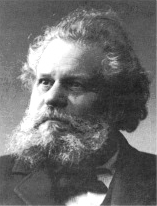- Giosuè Carducci
Infobox Writer
name = Giosuè Carducci
awards = awd|Nobel Prize in Literature |1906

birthdate = birth date|1835|7|27|mf=y
birthplace =Pietrasanta ,Tuscany ,Italy
deathdate = death date and age|1907|2|16|1835|6|27|mf=y
deathplace =Bologna ,Italy
occupation =Poet
nationality = ItalianGiosuè Carducci (pseudonym: Enotrio Romano) (
July 27 ,1835 –February 16 ,1907 ) was an Italian poet, oft reckoned one of Italy's greatest; also, a teacher. He was very influential and was regarded as the unofficialnational poet of modernItaly . In 1906 he became the first Italian to win theNobel Prize in Literature .Biography
He was born in Valdicastello, a small town in the northwest corner of
Tuscany in Province ofLucca . His father, a doctor, was an advocate of the unification of Italy. Because of his politics, the family was forced to move several times during Carducci's childhood, eventually settling for a few years inFlorence .From the time he was in college, he was fascinated with the restrained style of Greek and Roman antiquity, and his mature work reflects a restrained classical style, often using the classical meters of such Latin poets as
Horace andVirgil . He translated Book 9 ofHomer 's "Iliad " into Italian.He received his Ph.D. in 1856 from the
Scuola Normale Superiore di Pisa and began teaching school. The following year, he published his first collection of poems, "Rime". These were difficult years for Carducci: his father died, and his brother committed suicide.In 1859, he married Elvira Menicucci, and they had four children. He briefly taught Greek at a high school in
Pistoia , and then was appointed Italian professor at the university inBologna . He was a popular lecturer and a fierce critic of literature and society. His political views were consistently opposed to Christianity generally and the secular power of the Catholic Church in particular.“I know neither truth of God nor peace with the Vatican or any priests. They are the real and unaltering enemies of Italy,” he said in his later years. [Carelle, A., "Naturalismo Italiano", Draghi, Padova 1911, cited at http://www.infidels.org/library/historical/joseph_mccabe/dictionary.html]
This anti-clerical revolutionary zeal is prominently showcased in his most famous poem, the deliberately blasphemous and provocative "Inno a Satana" (or "Hymn to Satan".) The poem was composed in 1863 as a dinner party toast, published in 1865, then republished in 1869 by Bologna's radical newspaper, "Il Popolo", as a provocation timed to coincide with the 20th Vatican Ecumenical Council, a time when revolutionary fervor directed against the papacy was running high as republicans pressed both politically and militarily for an end of the Vatican’s domination over the papal states. ["Carducci, Giosuè, Selected Verse/ Giosuè Carducci: edited with a translation, introduction and commentary by David H. Higgins", (Aris & Phillips; Warminster, England), 1994. See also: Bailey, John Cann, "Carducci - The Taylorian Lecture," (Clarendon Press, Oxford) 1926.]
While "Inno a Satana" had quite a revolutionary impact, Carducci's finest poetry came in later years. His collections "Rime Nuove" ("New Rhymes") and "Odi Barbare" ("
Barbarian Odes ") contain his greatest works. [One prominent English translation is "The Barbarian Odes of Giosuè Carducci", translated from the Italian by William Fletcher Smith, (Manasha, Wisconsin: George Banta Publishing Co., 1939). The translation is reviewed in cite journal
last = Dismukes
first = William Paul
title = "The Barbarian Odes of Giosuè Carducci" by William Fletcher Smith
journal = "Italica"
volume = 17
issue = 1
pages = 29–30
date = March, 1940
id= ISSN 00213020 ]He was the first Italian to win the
Nobel Prize in Literature , in 1906. He was also elected a Senator of Italy. [cite book|last=Scalia|first=Samuel Eugene|title=Carducci|publisher=S.F. Vanni|location=New York|year=1937] Although his reputation rests primarily on his poetry, he also produced a large body of prose works [cite book|last=Tomasin|first=Lorenzo |title="Classica e odierna". Studi sulla lingua di Carducci|publisher=Olschki|location=Florence|year=2007] . Indeed, his prose writings, including literary criticism, biographies, speeches and essays, fill some 20 volumes. [cite book|title=Selections from Carducci; Prose and Poetry with introduction, notes and vocabulary by A. Marinoni|publisher=William R. Jenkins|location=New York|year=1913|pages=vii-ix] Carducci was also an excellent translator and translated some ofGoethe andHeine into Italian.He died in
Bologna at the age of 71.ee also
*
Jessie White Mario ources
* [http://nobelprize.org/nobel_prizes/literature/laureates/1906/press.html Nobel Prize Presentation Speech]
References
External links
* [http://nobelprize.org/literature/laureates/1906/carducci-bio.html Nobel Prize Biography page]
* [http://www.churchofsatan.com/Pages/RMCarducci.html Giosuè Carducci: 19th century poet, statesman and satanist]
* [http://www.0web.it/poesia/giosue-carducci Giosuè Carducci poems] Original Italian text
Wikimedia Foundation. 2010.
